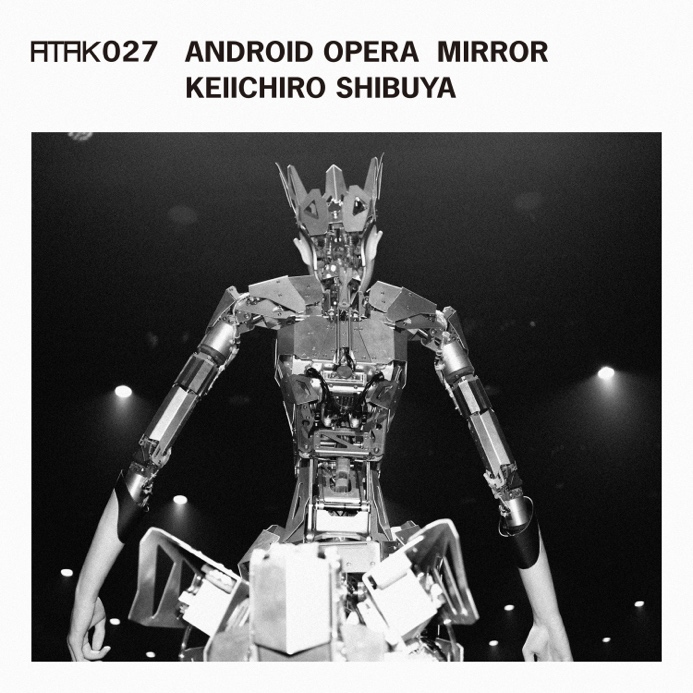
ATAK027
ANDROID OPERA MIRROR
Keiichiro Shibuya
21 February 2025 Released

The Android Opera, which concluded its Tokyo performance in June 2024, is a stage production where a humanoid robot equipped with AI merges with opera—arguably the most human-centric art form—and perform alongside an orchestra. Having been performed in various locations worldwide, including Australia, Japan, Germany, the Middle East, and France, it is now set to release its first album on Friday, February 21, 2025.
The album reconstructs the orchestral arrangements, piano, electronic sounds, and vocals into an audio work. In the original performances, the orchestral parts were played by humans; however, for this album, they have been re-created using state-of-the-art software simulations, sharpening the apocalyptic concept underpinning the work. Layered on top of this is the synthetic voice of the android. The only human performance comes from Keiichiro Shibuya’s delicate piano, serving as a metaphor for humanity confronting the end of the world.
The album’s opening track, “MIRROR,” symbolizes the story envisioned by Shibuya, blending hypnotic drones, tense rhythms, and orchestral flows with poetic, robotic vocalizations. It poses profound questions such as, “What defines the boundary between existence and non-existence?” and “Where does the boundary between the past and the future lie?”
In “Scary Beauty,” the text is an excerpt from The Possibility of the Island by French writer Michel Houellebecq, weaving together a rich tapestry of intersecting elements.
Throughout the album, iconic and memorable themes, experimental electronic music motifs, and grand neo-classical phrases combine to explore philosophical, religious, literary, artistic, and technological inquiries.
[Links]
Album『ATAK027 ANDROID OPERA MIRROR』:https://linkco.re/67huCCrD
Single 『I Come from the Moon (Android Oper ver.)』:https://linkco.re/YpAEDVAT
Official YouTube:https://www.youtube.com/@keiichiroshibuya
[Release Details]
Album Title: ATAK027 ANDROID OPERA MIRROR
Label: ATAK
Release Date: Friday, February 21, 2025 (Scheduled for simultaneous release on streaming platforms and CD).
[CREDIT]
Composition, Piano, Electronics: Keiichiro Shibuya
Text: Keiichiro Shibuya (#01) , GPT (#03,05,06,07,08), Excerpts from “The possiblity of the island” written by Michel Houellebecq (#02, #09) and “On Certainty” written by Ludwig Wittgenstein (#04)
Android Vocal Production: Keiichiro Shibuya, Shintaro Imai
Text-to-Note Programming: Takashi Ikegami (#04)
Mix, Piano Recording: François Baurin (Hinterland Lab)
Mastering: Rashad Becker (clunk)
Score Notation Assistant: Hiroto Kikukawa
Artwork: Ryoji Tanaka
Photograph: ayaka endo
Production: Natsumi Matsumoto (ATAK)
Produce: Keiichiro Shibuya (ATAK)
—
[Album Concept Text]
I Am the Only Human – On ATAK027 ANDROID OPERA MIRROR
Keiichiro Shibuya
Western music is fundamentally rooted in humanism.
By “Western music,” I mean everything from classical music and opera originating in Europe to pop music and hip-hop that emerged in the US and UK. For centuries, the image has remained the same: talented singers, conductors, musicians, pop stars, or rappers reigning at the center of the stage, performing narratives about human life—birth, sex, love, and death—while the audience is enthralled and ecstatic.
However, as we entered the 21st century, human society has increasingly revealed its limitations, seemingly accelerating toward its own demise. In this context, clinging to human-centric narratives seems less compelling than exploring alternative possibilities or imagining a post-human world. Such explorations may offer insights or remedies for a world hurtling toward its end.
The world is steadily heading toward its end. Android Opera explores variations of the end and the post-end world, sung by androids equipped with AI, leading a human orchestra.
Even if the world ends, wouldn’t it be worthwhile if the process and the aftermath were beautiful? Inspired by this thought, this project imagines androids and AI—entities that continue their endless evolution—singing alongside humans about the end of the world and what lies beyond. Most of the lyrics were generated by GPT, with the exception of fragments from works by Michel Houellebecq and Ludwig Wittgenstein.
This work has been performed in various cities such as Paris, Tokyo, and Dubai, with orchestrations and electronic elements upgraded at every iteration. While preparing for the album release, I attempted live recording with an orchestra but found myself dissatisfied with the results. The live recording of the orchestra felt fundamentally incomplete and incapable of achieving a “simulation of the end.”
After extensive trials and deliberation, I decided to replace all the orchestral parts with software. Today’s orchestral simulation software has reached an exceptionally high level of fidelity, making it nearly impossible for most people to distinguish between a simulated and live orchestra by ear. Among the best-quality orchestral simulation software available, I selected one and revised the score to generate all the orchestral parts as digital data.
This data was brought into an analog mixing console at a studio in Paris, where we applied countless processes—EQ, compression, delay, and more—just as we would mix a live orchestra. Over nearly a year, alongside my friend and mix engineer François, I worked on this mix-down, having already abandoned the live recording approach.
This album, therefore, is built on the paradox of treating an artificial, simulated orchestra in the exact same way as one would treat a human orchestra and vocalists. Since the music is a simulation of the end of the world, having the orchestra itself be a simulation of humanity created an extraordinary balance, which I felt confident was achieved in the final mix.
The android vocals were created by mixing multiple synthesized voices, aiming for information density comparable to human vocals, but without the emotional romanticism inherent to humans. After replacing the human orchestra with artificial sound, the android voices underwent comprehensive editing.
The piano parts, however, were entirely performed by me, the composer. This represents the only authentic, real element in the music.
If “I am the only human” represents the ultimate point of confrontation with the end of the world, then this is the concept of the album. The “I” could also be you, the listener, facing this music. Amidst android-generated voices, orchestras, and electronics, the piano, symbolizing the last human presence, floats yet exists unmistakably. You will hear it.
